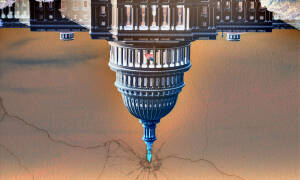After celebrating the 244th anniversary of the Declaration of Independence, might Americans find time to acknowledge our interdependence with other nations, nature and each other?
Don’t get me wrong. Flipping off a mad king to launch a bold experiment in representative self-government deserves a holiday. Even though the men who signed the document fell short of the ideals they espoused—freedom, equality and inalienable rights—securing them remains our goal. And we still haven’t fully attained it. That makes July 4 a time both to celebrate and to recommit.
Notions of independence are hard-wired into the national psyche. Colonists sailed away from the motherland, and then rebelled against their government. Westward expansion stories extol self-reliant pioneers, rugged individualists, solo entrepreneurs and independent family farmers. But freedom, equality and rights, much less representation, have never been universal.
America is still grappling with how to incorporate into our national narrative the stories of those marginalized in the early drafts. Native peoples pushed off their lands and decimated. Africans brought in chains as chattel property, and still treated as sub-human after slavery was abolished. Ethnic and religious minorities, who immigrated seeking economic opportunities despite our caste system and open prejudice. Women, who lacked suffrage for more than half our history and remain under-represented in government and underpaid at work. People whose gender identities or sexual preferences don’t conform to traditional expectations.

Independence vs. Interdependence
Among creatures, humans are born exceptionally dependent on their parents. We soon chafe at their constraints and seek independence. Teenagers are notoriously conflicted during the transition, as Anthony E. Wolf captures in his book, Get Out of My Life, But First Could You Drive Me and Cheryl to the Mall? By adulthood, most of us are happy to accept our parents’ help and to support them in old age. That’s interdependence.
July 4, 1776, is celebrated as America’s birthday, but it’s closer to being when the nation was conceived. Only after the hard labor of the Revolutionary War and ratifying the Constitution was the United States actually born. The national project began by declaring independence, but independence was a means to an end—government by consent of the governed. We achieved that through cooperation and interdependence.
The colonies did not individually declare independence. They rebelled together. At great risk. It was an act of treason. Remember that Benjamin Franklin said, “We must all hang together, or, most assuredly, we shall all hang separately.”
Nearly two and a half centuries later, our fate hangs less upon independence than on our ability to work together—as members of neighborhoods, communities, states, regions, nations and the planet. We’re all connected. We’re all interdependent. That’s why we have pedestrian crosswalks, sanitary sewer districts, state licensing boards, interstate highways, national parks and international treaties.
Our greatest threats cross borders. We cannot manage them independently. This fact has never been more apparent than during a global pandemic. What is true for a virus is true for virulent ideologies, transnational crime and environmental degradation. Just as our restaurants, stores and arenas cannot prosper until we fix our public health problem, the global economy cannot escape the effects of climate change. And we can only address climate change cooperatively.
Restoring U.S. Leadership
Unfortunately, America has retreated, and worldwide cooperation has ebbed. So-called “great-power competition” now defines our geopolitical landscape.
The world’s major powers are drifting back toward authoritarian models. China’s Xi Jinping and Russia’s Vladimir Putin, both originally elected to limited terms, have orchestrated “reforms” that make them presidents for life. Donald Trump envies them and teases often about trying the same thing here. If you cannot imagine such an outcome, don’t dare help him get a second term.
Authoritarianism cannot solve today’s problems. It is sclerotic, a relic of the past. Its attraction lies in a sort of teenage petulance toward the hard work required to equitably solve difficult, multifaceted issues. And it is a cover for fraud and theft at the top.
America’s proper role is not to brag about being first, to bully everyone, and end up alone. Our natural and historical role is to lead. We need to restore our alliances, rebuild international, rules-based organizations and model the accountable behavior and cooperative problem-solving that we’d like to see from others.
It is time to declare our interdependence.





